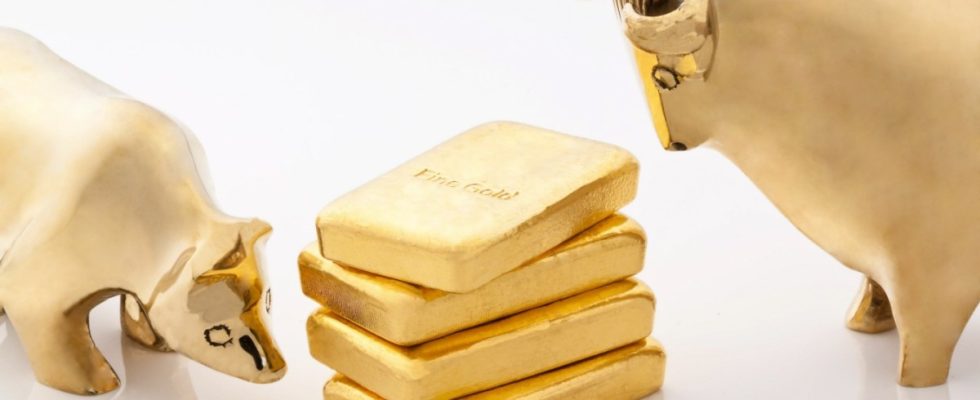When the most powerful banker in the world appeared before the press on Friday, he issued a clear warning to stock market investors worldwide: to speculate on falling interest rates now? “Premature,” said Federal Reserve Chairman Jerome Powell. However, investors simply brushed aside what was intended as an urgent warning – including in Germany.
At the beginning of the week, the German leading index Dax rose to 16,455 points on the stock exchange, meaning it was only a few points away from its highest level ever recorded. And this despite the fact that economists see the country in recession, politicians complain about “Germany as a location” – and some believe that inflation is still not under control. Investors on the stock exchange have pushed the domestic leading index up by 10.85 percent since the beginning of November, and the past month was even the best November on the Frankfurt trading floor since 1962. “The mood in German stocks is boiling over,” says Patrick Hussy from the analysis company Sentix.
What is probably responsible for the price rush is probably the most important tidal force on the capital markets: investors have been speculating for weeks that the central banks will soon lower their interest rates. Like playing dominoes, they rely on a whole chain of events. First, inflation is likely to continue to subside and central banks will then reduce their interest rates. If interest investments subsequently pay less, financial professionals invest more money in stocks.
While the stock market barometers are currently racing upwards, investors are expecting a downward pull in interest rates: If the financial professionals have their way, the major central banks are likely to reduce their interest rates as early as spring. “At times it is even assumed that the European Central Bank will lower key interest rates before the US Federal Reserve,” says Ulrich Kater, chief economist at Deka-Bank. By the end of next year, the key interest rates in the most important industrial countries could only be 1.5 to 2 percent. At least if investors are correct with their forecasts.
“The stock markets are currently hearing what they want.”
On Friday, Federal Reserve Chairman Jerome Powell tried to counter this market narrative. “We stand ready to further tighten our policy if necessary,” said the central bank chief. But on the stock exchanges, no one was interested in the words of what was probably the most powerful central banker in the world. “At the moment, investors are only hearing what they want to hear,” says market expert Jochen Stanzl from brokerage firm CMC Markets.
When stock market professionals interpret the statements of important central bankers, they always read between the lines. Anyone who, like Fed boss Jerome Powell, is only “ready” for interest rate increases and adds an “if” on top of it, is apparently neither actively planning for higher interest rates nor, at least at the moment, believes they are necessary. These nuances were enough for investors to ignore the central bank chief’s warnings.
In addition to the stock prices, the price of gold also rose significantly, it even reached a new record: a troy ounce of the precious metal with 31.1 grams cost a peak of $2,111 on Monday. Because gold doesn’t pay interest, it looks more attractive in the face of interest rate reduction bets. The same applies to the digital currency Bitcoin, which rose by seven percent on Monday and broke the $40,000 mark.
Now it’s about the credibility of the central banks
No matter whether Bitcoin, gold or DAX: all three price movements cast doubt on the credibility of central bankers like Powell. In the past two years, he and his colleagues around the world have pushed up key interest rates rapidly in order to combat inflation. Companies and consumers buy less on credit because of expensive interest rates, and prices would ultimately have to fall. However, investors have doubted the central banks’ determination seven times in a row in the past three years, always betting against higher interest rates – and time after time ensuring that prices rise. However, they have been disappointed again and again by the central bankers, at least until now.
According to economists, inflation could actually decline significantly in the coming year. In the spring, the price increase rate is likely to level off at 2.5 percent in both the euro area and the USA. If the inflation rate were to fall to just two percent by late summer, the central banks’ official target would even be achieved. Key interest rates could fall.
However, two developments could thwart the forecasts: firstly, lavish collective bargaining agreements could lead to higher inflation, and secondly, an escalation of the Middle East conflict could catapult the price of oil upwards. “It depends on when and how strongly the central banks react, take their foot off the brake and lower key interest rates again,” says capital market strategist Simon Landt from the private bank MM Warburg.
The price frenzy on the stock markets could also become a problem: in good phases on the trading floor, Americans in particular like to spend more because the book profits make them feel wealthier. However, this could inadvertently drive up prices and prompt Powell to demonstratively respond with higher interest rates. Then not only the stock markets could suffer, but also the real economy.

